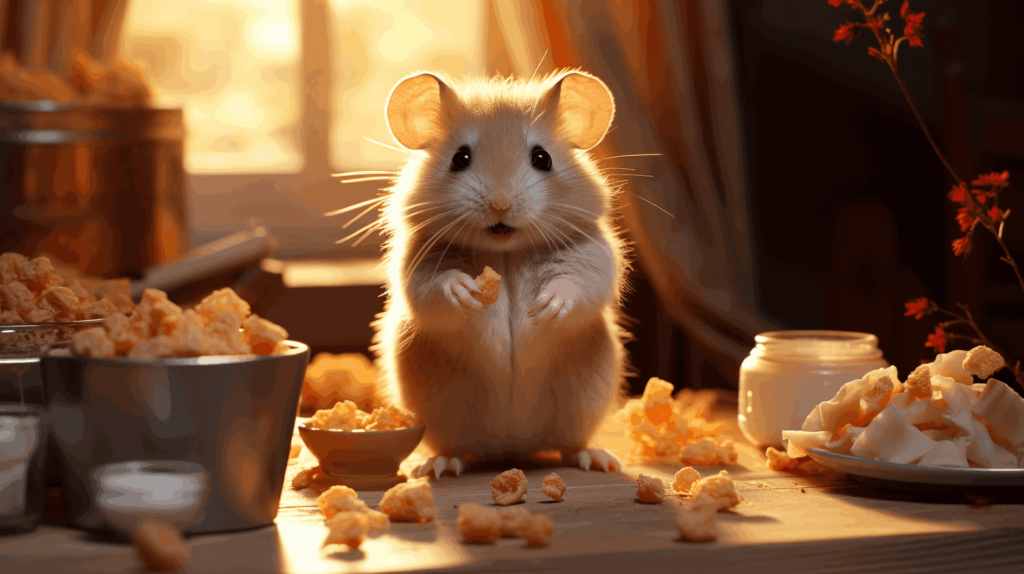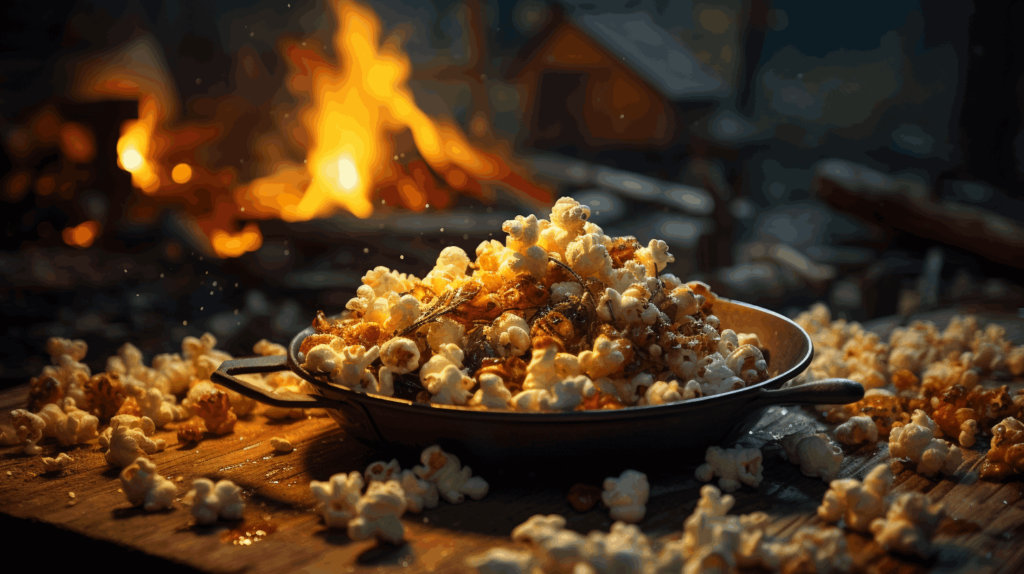In the realm of wildlife nutrition, the suitability of popcorn as a food source for wild animals is a topic of interest. This article aims to show which animals can safely consume popcorn and how it should be provided.
While air-popped popcorn can be digested by particular creatures like wild birds in moderation, caution is advised for foxes, deer, and badgers. This introduction will provide insights into appropriate feeding methods and highlight potential risks associated with excessive consumption.
Key Takeaways
- Wild birds can eat air-popped popcorn in moderation as their stomachs can digest it.
- Foxes, deer, and badgers can consume popcorn as a treat in their diet.
- Popcorn should be given to wild animals without salt, butter, oil, and flavorings.
- Feeding popcorn to wild animals should be done in moderation as it does not provide significant nutritional benefits.
Wild Birds and Popcorn
While wild birds can safely consume air-popped popcorn, it should be given in moderation as a treat and without any salt, butter, oil, or flavorings. Popcorn can be a fun and nutritious addition to a bird’s diet, providing fiber, carbohydrates, calcium, and iron.
However, it is essential to remember that popcorn should not be the primary source of nutrition for birds. Feeding them too much popcorn or popcorn with added salt, butter, oil, or flavorings can harm their health.
To feed wild birds popcorn, it is recommended to boil the kernels to soften them before offering them as a treat. By following these guidelines, you can safely enjoy sharing air-popped popcorn with the wild birds in your area.
Foxes and Popcorn
Foxes can consume a moderate amount of popcorn as a treat, but it should not be their primary source of nutrition. Foxes are omnivores and require a balanced diet of protein, vitamins, and minerals.
While popcorn can be given to foxes occasionally, it is essential to choose unsalted, unflavored options without added preservatives or chemicals. Softening the popcorn kernels in boiling water before feeding them to foxes can help prevent choking hazards.
Additionally, it is crucial to avoid feeding foxes too much popcorn, as it can attract rats and disrupt the local ecosystem. Instead, foxes should primarily rely on their natural diet of small mammals, birds, fruits, and vegetables for optimal health and nutrition.
Deer’s Relationship With Popcorn
Three popcorn kernels can be a delightful treat for deer if they are plain and unflavored. Deer, being herbivores, can consume both popped and unpopped popcorn. However, it is essential to note that popcorn should only be given to deer in moderation and as a treat, not as their main diet.
When feeding popcorn to deer, it is recommended to mix it with other foods, such as apples and carrots, to ensure a balanced diet. Avoiding flavored popcorn and choosing unflavored options without salt and butter is also essential. Additionally, microwave popcorn with preservatives is not suitable for deer.
To attract deer, scatter the popcorn mixture in wooded areas. By following these guidelines, popcorn can be a tasty and enjoyable snack for deer while ensuring their overall health and nutritional needs are met.
Can Badgers Eat Popcorn
Although badgers are omnivores, it is essential to offer them popcorn in moderation and choose unsalted, unflavored options to ensure their health and well-being. Here are three reasons why it is crucial to be mindful of the popcorn we feed to badgers:
- Nutritional balance: While popcorn may be a tasty treat for badgers, it lacks significant nutritional value. Feeding them too much popcorn can lead to imbalances in their diet, depriving them of essential vitamins and minerals.
- Health risks: Flavored popcorn can harm badgers, particularly those with added preservatives and chemicals. These additives may cause digestive issues and negatively impact their overall health.
- Natural foraging behavior: Badgers are skilled foragers, and relying on humans for food can disrupt their instincts. Offering popcorn as an occasional treat and placing it away from your home allows badgers to engage in their natural foraging behavior.
Feeding Popcorn to Wild Birds
To ensure the health and well-being of wild birds, it is advisable to refrain from feeding them popcorn with salt, butter, oil, or flavorings and instead opt for air-popped popcorn.
While birds can digest air-popped popcorn, adding salt, butter, oil, or flavorings can harm their delicate digestive systems. Air-popped popcorn provides a safer alternative and can be given to birds as an occasional treat.
It is important to note that popcorn should not make up a significant portion of their diet, as it lacks essential nutrients for birds. Additionally, boiling the popcorn kernels before feeding them to birds can help soften them, making them more easily consumed.
Tips for Feeding Popcorn to Foxes
Foxes can enjoy popcorn in moderation, but avoiding flavored options and choosing unsalted, unflavored popcorn for their dietary needs is essential. When feeding popcorn to foxes, there are several tips to keep in mind:
- Opt for unsalted, unflavored popcorn: Flavored popcorn can contain additives and preservatives that may not be healthy for foxes. Choosing plain, unsalted popcorn ensures they get a natural and nutritious treat.
- Soften the popcorn kernels: Foxes have smaller jaws and teeth than humans, so it is recommended to boil them in water before feeding them to foxes. This makes it easier for them to consume and digest.
- Feed in moderation: While popcorn can be a tasty and enjoyable treat for foxes, it should not make up a significant portion of their diet. Providing a balanced diet with other essential vitamins and minerals is crucial to keep them healthy.
How to Feed Popcorn to Deer
A recommended approach for feeding popcorn to deer is to mix a small amount of popped and unpopped popcorn with apples and carrots to provide a balanced diet. Deer are vegetarians and can consume both popped and unpopped popcorn. However, avoiding flavored popcorn and choosing unflavored options without salt and butter is essential. Microwave popcorn with preservatives is also not suitable for deer.
Popcorn is an Occasional Treat for Badgers
Occasionally, badgers can enjoy popcorn as a treat, but it should not be given to them in large quantities. While it may seem tempting to share a bowl of popcorn with these adorable creatures, it is essential to remember that their dietary needs differ from ours. Here are three reasons why badgers should only have popcorn in moderation:
- Nutritional Imbalance: Popcorn is not a highly nutritious food for badgers and should not replace their regular diet. It lacks essential nutrients that they need for their overall health and well-being.
- Digestive Issues: Badgers have sensitive digestive systems, and consuming large quantities of popcorn can lead to digestive problems such as bloating or diarrhea.
- Dependency: Feeding badgers too much popcorn can create a dependency on human food, which is not ideal for survival in the wild. It is crucial to maintain their natural hunting and foraging instincts.
Key Points to Remember When Feeding Popcorn to Wild Animals
It is important to remember key points when considering the nutritional needs of wild animals and feeding them popcorn.
- Popcorn should be given as a treat and not as their main diet.
- When feeding wild birds, it is safe to offer them air-popped popcorn, but it should be free from salt, butter, oil, and flavorings.
- Boiling the popcorn can help soften the kernels before feeding.
- Foxes can consume popcorn in moderation but also require vitamins and minerals for a healthy diet.
- Deer, being vegetarians, can eat popped and unpopped popcorn, but it is best to mix it with apples and carrots for a balanced meal.
- Badgers can occasionally eat popcorn, but it should be unsalted and unflavored, without added preservatives or chemicals.
Overall, it is crucial to be mindful of wild animals’ nutritional content and feeding habits when offering them popcorn.
Responsible Feeding of Popcorn to Wild Animals
As discussed previously, feeding popcorn to wild animals should be approached responsibly and in moderation, ensuring that it is free from salt, butter, and flavorings. To evoke emotion in the audience, consider the following points:
- Consider the well-being of the animals: Feeding wild animals is a delicate matter. Prioritizing their health and natural diet is essential rather than indulging them with unhealthy snacks.
- Preserve their instincts: Wild animals should not become dependent on humans for food. Overfeeding or providing inappropriate food can disrupt their natural behavior and potentially harm their survival.
- Protect their habitat: Feeding wild animals in their natural environment can help maintain their connection to their habitat and preserve their natural foraging skills.
Conclusion
In conclusion, while wild birds, foxes, deer, and badgers can consume popcorn in moderation, it should only be provided as an occasional treat, not as a diet staple.
Plain, unsalted, and unflavored popcorn is the safest option for these animals. Excessive consumption of popcorn can pose potential risks to their well-being.
Therefore, it is crucial to responsibly feed popcorn to wild animals, keeping their dietary needs and limitations in mind.


